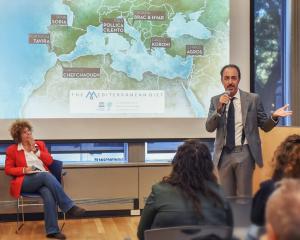Explore roots tourism, the Mediterranean Diet, and a sustainable future at the NYU conference. Global summit in Pollica, Italy announced for November 2024.
— Sara Roversi, President – Future Food Institute; Paideia Campus.
NEW YORK, NY, UNITED STATES, October 15, 2024 /EINPresswire.com/ — Roots Tourism and Cultural Heritage: The Power of Food and the Values of Roots
On Tuesday, October 10, 2024, New York University hosted a groundbreaking conference that explored the intersection of roots tourism, cultural heritage, and gastrodiplomacy. Titled “The Power of Food and the Values of the Roots: Building a Sustainable Future through Gastrodiplomacy and Cultural Alliances,” this event brought together thought leaders and experts to examine how traditional food practices can serve as a bridge between nations and a powerful tool for fostering a sustainable future.
Organized by NYU’s Department of Nutrition and Food Studies in collaboration with Italea Campania, the Future Food Institute, and the Centro Studi Dieta Mediterranea, the conference highlighted the growing importance of roots tourism and heritage preservation in our increasingly interconnected world.
Roots Tourism: A Journey of Self-Discovery
Giovanni Maria De Vita, Consigliere at the Ministry of Foreign Affairs and International Cooperation, emphasized the importance of roots tourism:
“Turismo delle Radici is more than just a touristic promotion; it is a systemic strategy designed to create lasting legacies and deepen connections between Italy and its global diaspora. By valuing our immense cultural heritage, we celebrate the Italians around the world who act as cultural pollinators, bringing the richness of Italian tradition to new shores while reinforcing their ties to their ancestral homeland.”
Expanding on this theme, Germana Valentini, author of “Veniero. Storie di emigranti italiani a New York,” shared captivating stories of Italian emigrants in New York. Valentini’s work illuminates the profound connections between food, identity, and cultural heritage, demonstrating how culinary traditions have helped Italian-Americans maintain ties to their roots while adapting to life in a new country.
The Mediterranean Diet: A Cultural Bridge and Scientific Marvel
A central focus of the conference was the Mediterranean Diet, recognized by UNESCO as an Intangible Cultural Heritage of Humanity. Andrew Fierberg, award-winning film producer and director of “Keys to Italy,” provided a unique perspective on the legacy of Ancel Keys, the American scientist who studied and codified the Mediterranean Diet in Pollica, Cilento.
Fierberg’s insights highlighted how Keys’ work not only brought global attention to the health benefits of the Mediterranean Diet but also fostered cultural exchange between Italy and the United States. His film “Keys to Italy” explores how this scientific endeavor became a bridge between cultures, influencing global nutrition and lifestyle practices.
Stefano Pisani, Mayor of Pollica and Chairman of the Centro Studi Dieta Mediterranea, built on this foundation:
“The Mediterranean Diet is not just a diet; it is a model of integral ecological development. It brings together health, biodiversity, and sustainability. As we face global challenges, this centuries-old way of life offers a blueprint for sustainable living that integrates the well-being of individuals, communities, and the planet. Pollica has become a living laboratory for this model, showing the world how food heritage can drive positive change.”
Gastrodiplomacy and Cultural Alliances
Sara Roversi, President of the Future Food Institute, elaborated on the concept of gastrodiplomacy:
“Gastro-diplomacy is a powerful tool that connects heritage, roots, and culture to foster sustainable and inclusive growth. It uses food as a common language to build bridges between nations and communities, creating a shared space where traditions can be preserved, celebrated, and innovated. The Mediterranean Diet is a living example of how culinary heritage can inspire global change, promoting health, sustainability, and social well-being.”
Complementing Roversi’s perspective, Robert Campana, founder of Stop Italian Sounding, discussed the importance of protecting authentic Italian culinary traditions in the global marketplace. Campana’s work underscores how gastrodiplomacy can also serve as a means of preserving cultural integrity and promoting fair trade practices in the food industry.
Education and Future Perspectives
Lisa Sasson, Associate Dean at NYU’s Department of Nutrition and Food Studies, provided valuable insights into how academic institutions are incorporating the principles of the Mediterranean Diet and sustainable food systems into their curricula. Sasson emphasized the role of education in promoting cross-cultural understanding and sustainable practices through food studies.
The conference at NYU was part of a series of events celebrating Columbus Day and highlighting Italy’s Turismo delle Radici strategy. These events included a session at the Italian Cultural Institute focusing on roots tourism and a masterclass at the Culinary Institute of America exploring the Mediterranean Diet as a model for sustainable culinary practices.
By bringing together this diverse group of experts, the event sought to inspire new approaches to global challenges through the universal language of food, highlighting the power of gastrodiplomacy and cultural alliances in preserving living heritage while building a sustainable future.
Looking Ahead: Mediterranean Diet Global Summit
During the event, Stefano Pisani announced the upcoming Mediterranean Diet Global Summit, scheduled for November 14-17, 2024, in Pollica, Italy. This summit will bring together global experts to explore how the Mediterranean Diet can address pressing global issues such as biodiversity loss, sustainable agriculture, and public health.
Media Team
Future Food Institute
+39 347 424 3303
email us here
Visit us on social media:
Facebook
Legal Disclaimer:
EIN Presswire provides this news content “as is” without warranty of any kind. We do not accept any responsibility or liability
for the accuracy, content, images, videos, licenses, completeness, legality, or reliability of the information contained in this
article. If you have any complaints or copyright issues related to this article, kindly contact the author above.
![]()








